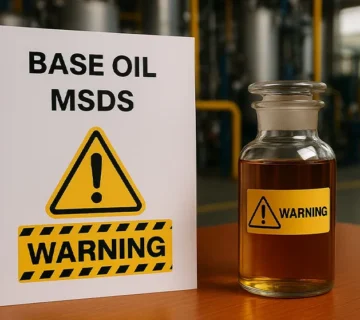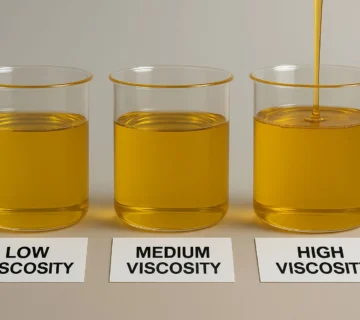Base Oils for Lubricants vs Crude Oil: Key Differences and Applications
Lubrication plays a vital role in machinery, automotive, and industrial applications. While crude oil is the source of base oils, they undergo significant refining to achieve the properties required for lubrication. In this article, we explore the differences between base oils and crude oil, their applications, and why high-quality base oils are essential for lubricant production.
What is Crude Oil?
Crude oil is a naturally occurring, unrefined petroleum product composed of hydrocarbons and other organic materials. It is extracted from underground reservoirs and serves as the primary raw material for various petroleum-based products, including gasoline, diesel, jet fuel, and lubricants. Crude oil is classified into different types based on its sulfur content and density, such as:
- Light Crude Oil – Low density and high API gravity
- Heavy Crude Oil – High density and low API gravity
- Sweet Crude Oil – Low sulfur content
- Sour Crude Oil – High sulfur content
While crude oil is essential for the energy sector, it requires extensive refining to produce usable products, including base oils.
What Are Base Oils?
Base oils are refined from crude oil and serve as the primary component in the production of lubricants. The refining process removes impurities, sulfur, and unwanted hydrocarbons to improve performance. Base oils are classified into different groups based on their refining methods and chemical properties:
Base Oil Groups:
- Group I – Solvent-refined with a high level of sulfur and unsaturated hydrocarbons.
- Group II – Hydroprocessed with improved oxidation stability and lower sulfur content.
- Group III – Highly refined with superior viscosity and thermal stability.
- Group IV – Polyalphaolefins (PAOs), synthetic base oils with excellent performance.
- Group V – Non-conventional base oils, including esters and silicones.
Key Differences: Base Oils vs. Crude Oil
| Feature | Crude Oil | Base Oil |
| Composition | Unrefined hydrocarbon mix | Refined hydrocarbon molecules |
| Sulfur Content | Varies (can be high) | Low (especially Group II & III) |
| Refining Process | Minimal processing | Extensive refining & purification |
| Application | Fuel, chemicals, plastics | Lubricants, greases, industrial oils |
| Oxidation Stability | Poor | High (especially Group II, III, IV) |
| Lubricating Properties | Not suitable | Essential for friction reduction |
Why Are Base Oils Essential for Lubricants?
Base oils contribute to over 80% of the composition of finished lubricants, with additives enhancing their performance. High-quality base oils provide:
- Thermal Stability – Prevents breakdown at high temperatures.
- Oxidation Resistance – Extends oil life and reduces sludge formation.
- Viscosity Stability – Ensures consistent lubrication under different conditions.
- Low Volatility – Reduces oil consumption and emissions.
Applications of Base Oils
Base oils are widely used in industries such as:
- Automotive Lubricants – Engine oils, transmission fluids, and gear oils.
- Industrial Lubricants – Hydraulic oils, compressor oils, and turbine oils.
- Metalworking Fluids – Cutting and grinding oils.
- Greases – Thickened lubricants for machinery and bearings.
Work and Energy Company: Your Trusted Supplier of Base Oils
Work and Energy Company (WESTINOL) is a leading supplier of petroleum raw materials, including high-quality base oils, to industries worldwide. We offer:
- Base Oil SN500, SN150, and SN350
- Rubber Process Oils (RPOs)
- Slack Wax & Bitumen
- Custom Blended Lubricants & Private Labeling
Contact Us
Need help selecting the right base oil or want to request a quote? We’re here to assist you.
WhatsApp: (+971) 585992028
Phone: (+971) 58 599 20 28
Email: info@workandenergy.com
Office Address: No. 106, Sabkha Tower, Deira, Dubai, UAE
Visit Base oil product list: Base Oil
FAQ’s
1. What is the difference between synthetic and mineral base oils?
Mineral base oils are derived from crude oil through refining, while synthetic base oils are chemically engineered for enhanced performance, offering better oxidation stability and viscosity control.
2. What are the best base oils for engine lubricants?
Group II and Group III base oils are commonly used for modern engine oils due to their excellent stability and low volatility.
3. Does Work and Energy Company provide bulk export options?
Yes, we supply bulk base oils globally, ensuring timely delivery and customized packaging options.
4. What factors should I consider when choosing a base oil?
Consider viscosity, oxidation resistance, sulfur content, and the intended application.
5. How can I get a quote for bulk orders?
You can contact us via WhatsApp or email, and our sales team will assist you with pricing and delivery options.
6. What are the key benefits of using high-quality base oils?
High-quality base oils provide better oxidation stability, thermal resistance, and viscosity control, ensuring improved lubricant performance and equipment protection.
7. What is the role of additives in lubricants?
Additives enhance base oil properties by improving performance characteristics such as anti-wear, anti-oxidation, and detergent capabilities.
8. Are all base oils derived from crude oil?
Most base oils originate from crude oil, but Group IV and Group V base oils are synthetically produced for specialized applications.
9. Can base oils be used without additives?
Base oils alone do not provide sufficient protection; additives are essential to enhance lubrication, prevent wear, and maintain oil stability.
10. What packaging options does Work and Energy Company offer?
We offer various packaging solutions, including drums, flexitanks, and ISO tanks, to meet the diverse needs of our customers.
For premium-quality base oils and petroleum products, trust Work and Energy Company—your reliable partner in the lubricants industry!






No comment